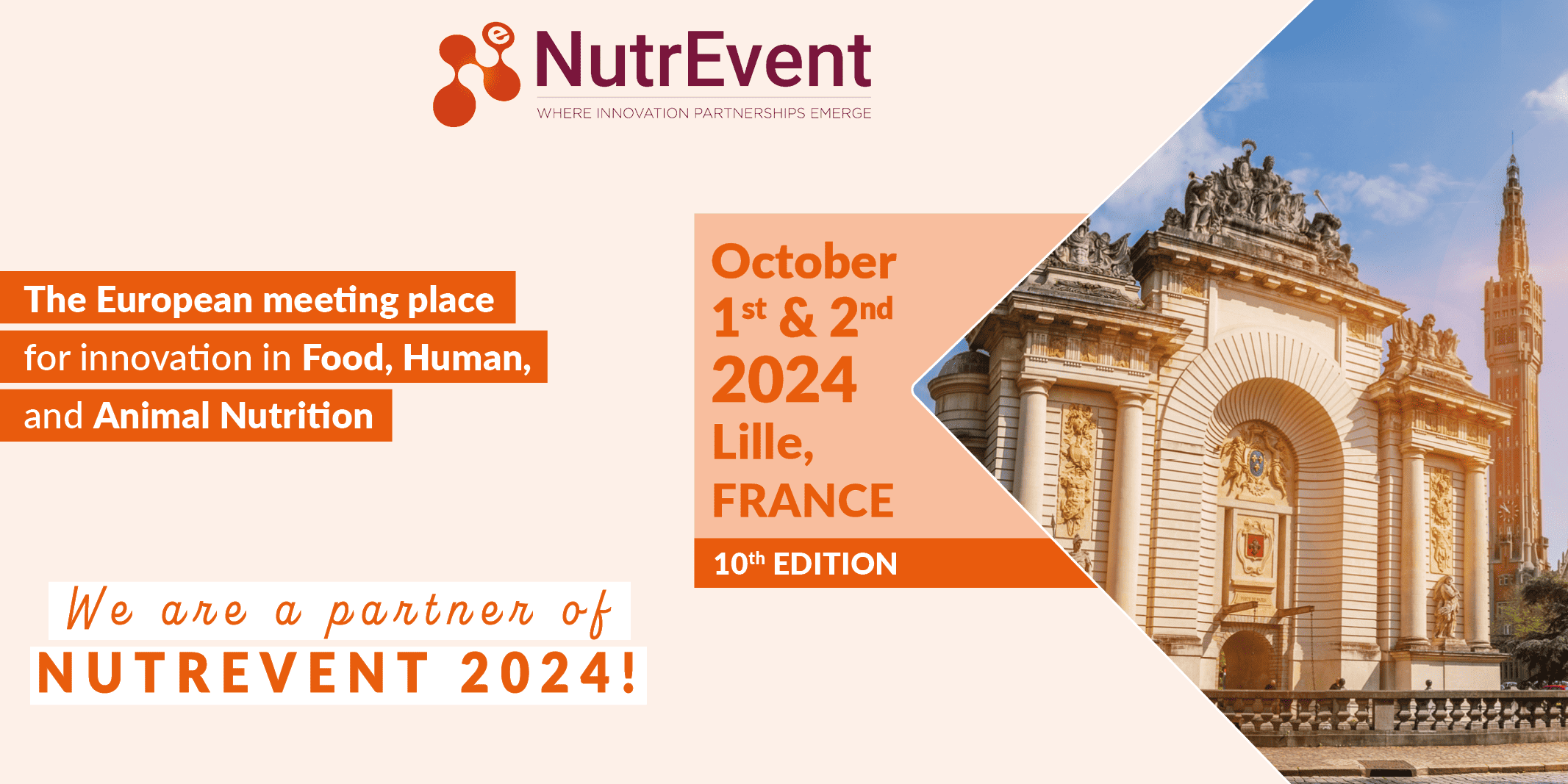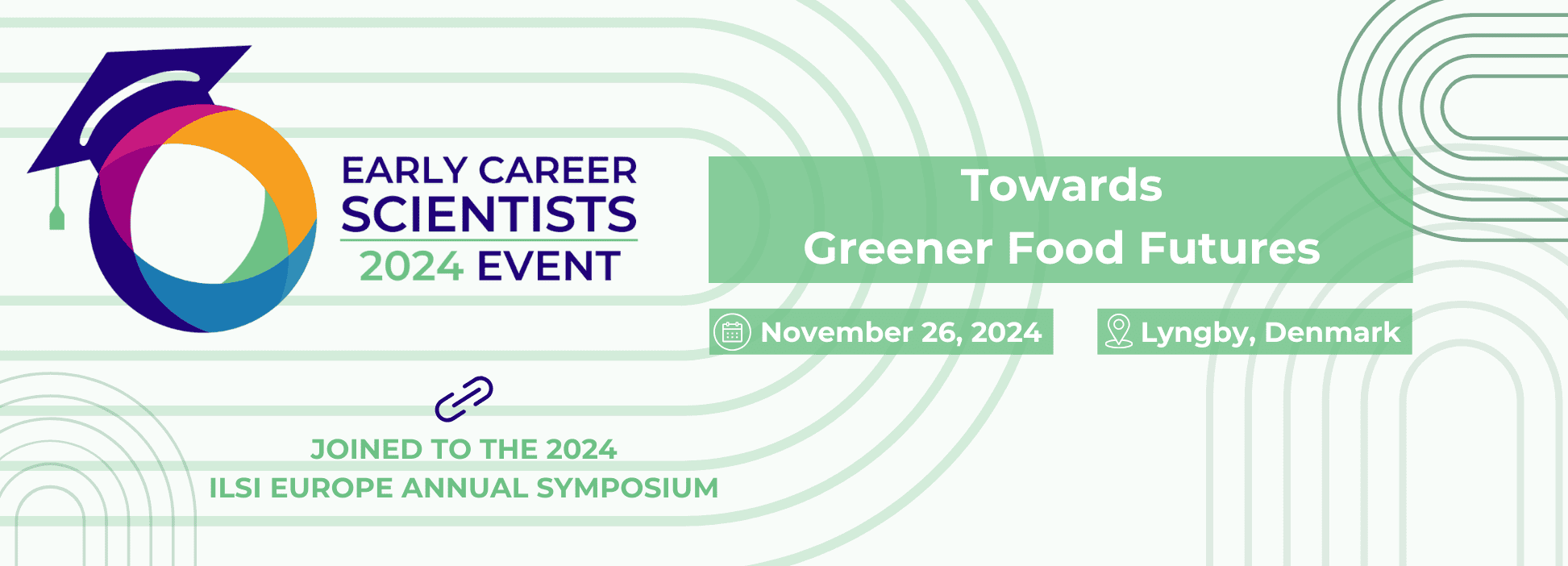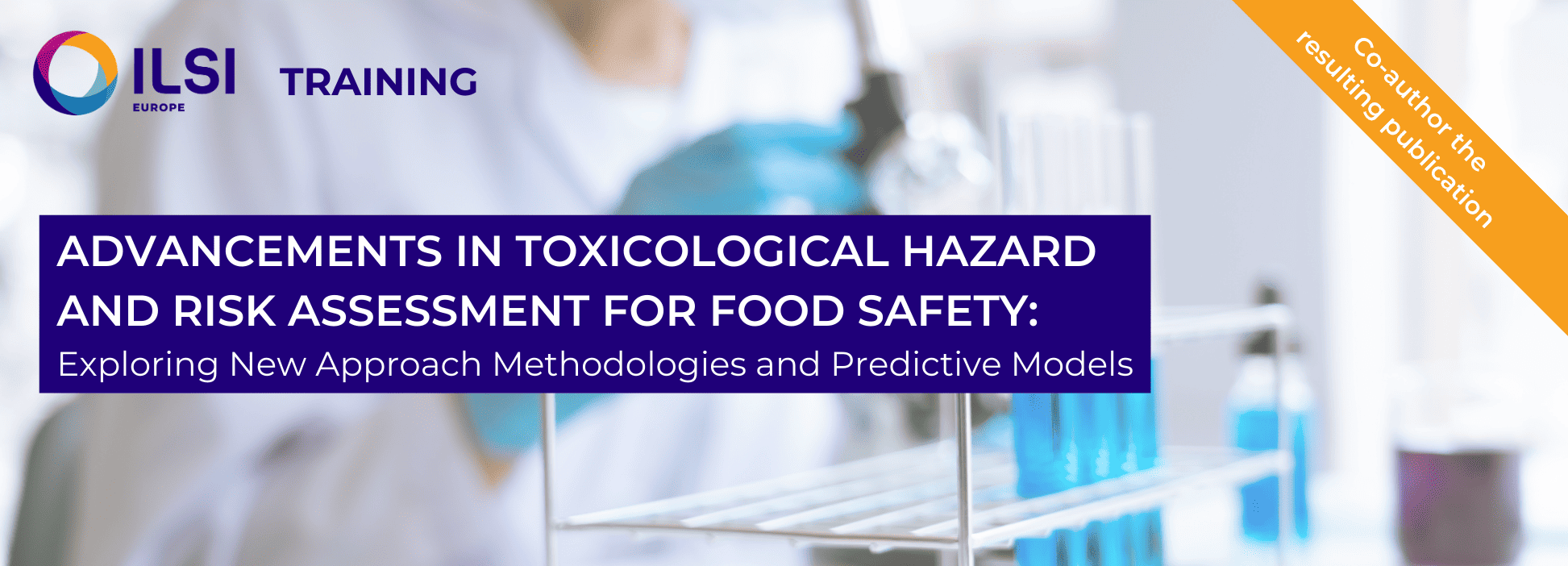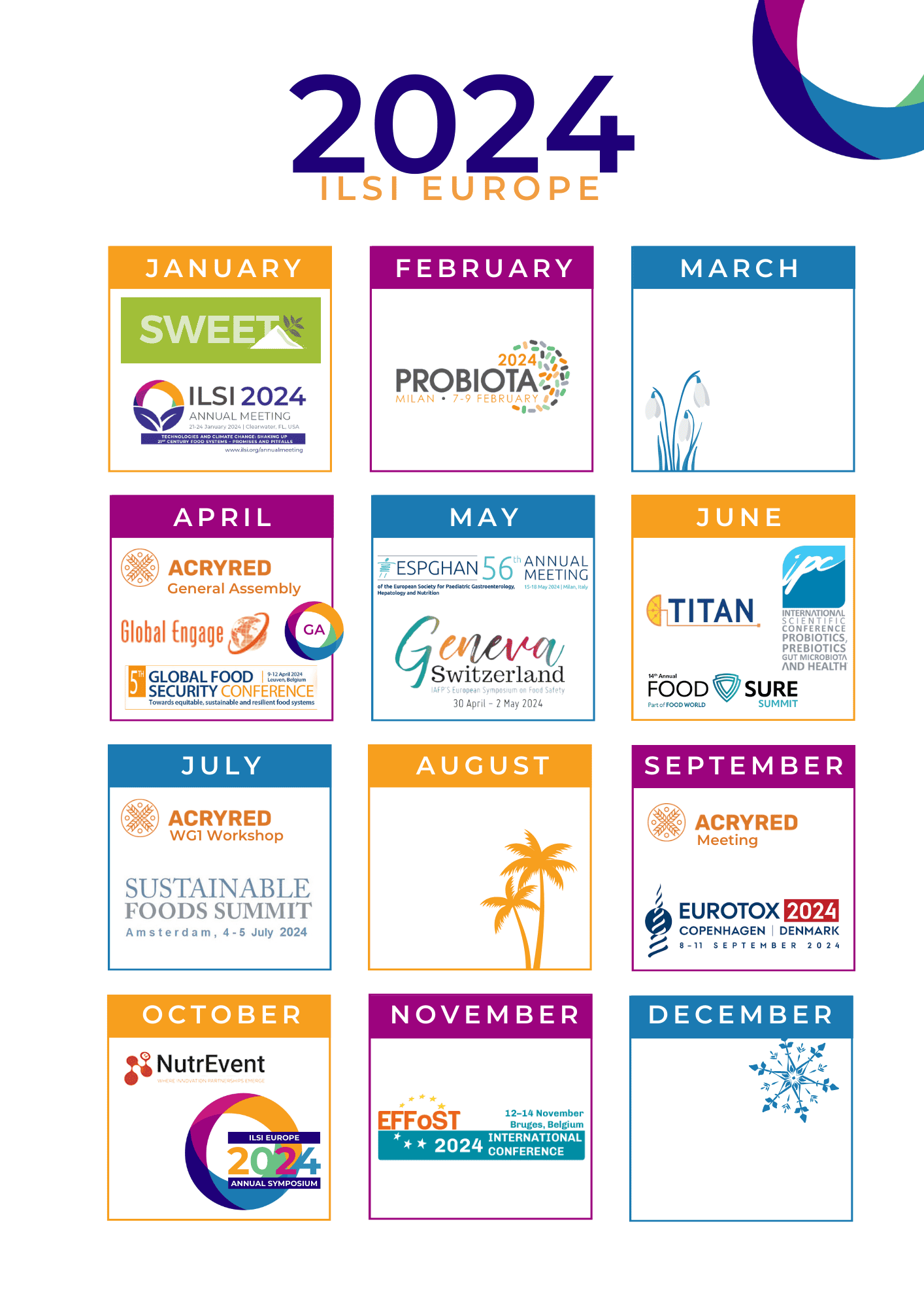ILSI Europe hosts, sponsors, and co-organises a variety of scientific events. These include independent symposia, workshops, webinars, hands-on scientific trainings and sessions held as part of the program of larger scientific conferences or professional meetings.
Discover below the upcoming events we are organising or participating in.
Upcoming Events
Training on New Approach Methodologies: follow-up call
29/08/2024 – 28/08/2024
online, Zoom
The course aims at providing state-of-the-art knowledge on the recent developments in toxicological hazard and risk assessment, with an emphasis on the application in food safety.
58th Congress of the European Societis of Toxicology
08/09/2024 – 11/09/2024
Copenhagen, Denmark
NutrEvent 2024
01/10/2024 – 02/10/2024
Lille, France
38th EFFoST International Conference 2024
12/11/2024 – 14/11/2024
Bruges, Belgium
Early Career Scientists Event 2024
26/11/2024
Lyngby, Denmark
- Two online webinars on 28 May 2024 (2pm-4pm) and 30 May 2024 (2pm-4pm).
- Two days of in-person training at ILSI Europe's office in Brussels on 2 & 3 July 2024 (full day).
- A follow up online call on 29 August 2024 (2pm-4pm).

About the event
The Danish Society of Toxicology and Pharmacology has the honor to organise EUROTOX 2024 in Copenhagen, the capital of Denmark. The congress will take place from 8 to 11 September 2024.
The congress theme "Toxicology - A Quest for safe Chemicals and Medicines" reflects the congress programme including a variety of topics dealing with safety of drugs and environmental chemicals, new and emerging technologies, personalised medicine, human health effects caused by exposure to chemicals as well as safety issues arising from climate changes.
The Local Organising Committee (LOC) and the Scientific Programme Committee (SPC) have made an inspiring programme, including the newest aspects of modern toxicology and methodologies. We emphasise the importance of interdisciplinary collaboration within toxicology and with the medical industries.The Scientific Programme (SP) includes four "Short Oral Communications Sessions" (OS) giving the young researches the possibility to present their latest research results. We encourage everyone to submit their abstract to get the possibility to present at one of the numerous OS. The venue is The Tivoli Congress Center, located in the city centre at the waterfront, 12 min by metro from Copenhagen Airport, walking distance to central city locations e.g. the Tivoli Park, the railway station and the Town Hall Square. The Congress Centre, designed by the architect Kim Utzon, has a capacity of up to 5500 meeting participants, includes congress hall, auditoriums and big meeting rooms all at the ground floor. The Tivoli Hotel has 679 rooms, swimming pool, playrooms, fitness & business centers, cloud bar and restaurants. Another 3000 hotel rooms are located within walking distance.
Further information
Website [post_title] => 58th Congress of the European Societis of Toxicology [post_excerpt] => [post_status] => publish [comment_status] => closed [ping_status] => closed [post_password] => [post_name] => 58th-congress-of-the-european-societis-of-toxicology [to_ping] => [pinged] => [post_modified] => 2024-02-05 09:37:58 [post_modified_gmt] => 2024-02-05 09:37:58 [post_content_filtered] => [post_parent] => 0 [guid] => https://ilsi.eu/?post_type=event&p=14169 [menu_order] => 0 [post_type] => event [post_mime_type] => [comment_count] => 0 [filter] => raw ) [2] => WP_Post Object ( [ID] => 14143 [post_author] => 351 [post_date] => 2024-02-01 14:28:30 [post_date_gmt] => 2024-02-01 14:28:30 [post_content] =>
About the event
NutrEvent is back for its 10th edition! ILSI Europe, as an event's partner, will participate with a booth
NutrEvent is the first European partnering event dedicated to to innovation in Food, Human and Animal Nutrition. It aims at identifying industrial, scientific, commercial and financial partners for your innovation projects and innovations.
The conference gathers more than 600 international actors: Food, feed, clinical nutrition, food supplement, pharmaceutical industries and distributors, innovative ingredient and process suppliers, academic institutions, technology transfer organisations, research institutes, R&D services and consulting firms and investors.
Registration
Contact us at events@ilsieurope.be to get a 20% discount !
Contact
Website: www.nutrevent.com
Email: cfillon@eurasante.com
[post_title] => NutrEvent 2024 [post_excerpt] => [post_status] => publish [comment_status] => closed [ping_status] => closed [post_password] => [post_name] => nutrevent-2024 [to_ping] => [pinged] => [post_modified] => 2024-02-01 14:31:26 [post_modified_gmt] => 2024-02-01 14:31:26 [post_content_filtered] => [post_parent] => 0 [guid] => https://ilsi.eu/?post_type=event&p=14143 [menu_order] => 0 [post_type] => event [post_mime_type] => [comment_count] => 0 [filter] => raw ) [3] => WP_Post Object ( [ID] => 14172 [post_author] => 351 [post_date] => 2024-02-05 10:10:12 [post_date_gmt] => 2024-02-05 10:10:12 [post_content] =>
About the event
The 38th EFFoST International Conference will be hosted by KU Leuven and UGent and will be held in the city of Bruges in Belgium. The EFFoST2024 conference will explore the theme "Future Food Systems: Innovation through Progress at Scientific Interfaces". We look forward to welcoming you in the city of Bruges, from 12-14 November 2024.
EFFoST2024 embraces the quintuple innovation helix framework, promoting interdisciplinary collaboration in the food sector. Our mission is to advance the global goal of providing safe, nutritious, and sustainable food with broad consumer acceptance, aligning with the 'one health' concept defined by WHO.
Discover the pinnacle of food science and technology at the annual EFFoST conference. Join global experts, scientists, industry leaders, policymakers, and students from diverse food-related fields.
Further information
Website [post_title] => 38th EFFoST International Conference 2024 [post_excerpt] => [post_status] => publish [comment_status] => closed [ping_status] => closed [post_password] => [post_name] => 38th-effost-international-conference-2024 [to_ping] => [pinged] => [post_modified] => 2024-02-05 10:10:12 [post_modified_gmt] => 2024-02-05 10:10:12 [post_content_filtered] => [post_parent] => 0 [guid] => https://ilsi.eu/?post_type=event&p=14172 [menu_order] => 0 [post_type] => event [post_mime_type] => [comment_count] => 0 [filter] => raw ) [4] => WP_Post Object ( [ID] => 14290 [post_author] => 362 [post_date] => 2024-04-04 10:53:08 [post_date_gmt] => 2024-04-04 10:53:08 [post_content] =>
About the event
ILSI Europe is organising an event for Early Career Scientists (ECS) focussed on sustainable food systems. The event offers a great opportunity for young scientists to present their work, network and expand their knowledge about important topics related to food sustainability. It is also offers a chance for industry and academic experts to discover a new pool of talent and gain a fresh point of view on the research this area.
If you are an Early Career Scientist (student, PhD candidate, or practising scientist who received their highest certificate (e.g. BSc, MSc or PhD) within the past ten years) and work within this nexus, we would like to hear from you! We welcome abstracts for oral and poster presentations from researchers working on food waste and by-products valorisation, soil health, or the sustainable design of products and processes.
Additionally, our career development session promises an interactive exploration of opportunities to propel young scientists' careers forward. Delve into funding possibilities, entrepreneurial ventures, and other pathways to professional growth. Gain valuable insights, resources, and guidance to navigate your career journey with confidence and clarity.
The ECS event is joined with the ILSI Europe Annual Symposium, which will be held the next day. The registration will give you access to both days.
Stay tuned for more details on this exciting event designed to empower and support early career scientists on their path to success.
More information on the practicalities of the event coming soon!
Call for abstracts
We accept abstracts from early career scientists for the following sessions:
- Session 1 - Green by Design: Innovating with Sustainability in Mind
- Session 2 - Up-cycling the up-cyclable: new perspectives in green, bio-based, and circular valorisation of food waste and food by-products
- Session 4 - From the Ground Up: Exploring the Vital Links between Soil Health and Sustainable Food Systems
Descriptions can be found in the programme below.
Abstracts will be selected on the basis of scientific excellence and relevance to the sessions.Submissions will be accepted until 15 June. Authors will be notified in August.
Travel and accommodation for the selected speakers will be covered by ILSI Europe (oral presentations only).
Important note: We will only accept abstracts from early career scientists for these three sessions. An early career scientist is defined as a postgraduate student or scientist from academia or industry who has obtained their highest degree (BSc, MSc or PhD) within the last ten years.
Send an abstractProgramme
Here is the detailed programme for the Early Career Scientists event.To find the detailed programme for ILSI Europe Annual Symposium, click here.
8:30 - 9:00
Registration
9:00 - 10:30
Session 1 - Green by Design: Innovating with Sustainability in Mind
Nearly all human activities can result in resource depletion, ecological damage, and environmental pollution. To minimize these potentially damaging effects, change is necessary towards a more responsible way of designing human activities. This includes food production and processing. To implement such change, we should apply sustainable design principles: consider and minimize environmental impact when developing ingredients, products, and food production processes. This can be done by finding ways to reduce waste, reuse resources, and recycle products and materials. This is known as the "3R principles", which can be further extended to the 10R principles: Reduce, Reuse, Recycle, Renew, Recharge (or Refill), Repair (or Remedy), Re-manufacture (or Recover), Replace (or Replant), Re-clear (or Refine) and Remove.
10:30 - 11:00
Networking break & Poster session
11:00 - 12:30
Session 2 - Up-cycling the up-cyclable: new perspectives in green, bio-based, and circular valorisation of food waste and food by-products
The agri-food chain is affected by resource scarcity, food loss, and waste and by-products production. A specific life cycle assessment of agri-food chains can highlight the critical points, elucidating the targets that research and policy management must work with in the near future. The EU waste policy aims to contribute to the circular economy by extracting high-quality resources from waste as much as possible. The European Green Deal aims to promote growth by transitioning to a modern, resource-efficient, and competitive economy. As part of this transition, green and bio-based approaches will drive new perspectives in food waste and by-products up-cycling, including recalcitrant biomasses. Fermentation, precision fermentation, and bio-catalysis coupled with other green approaches will permit the release of new processes, new products, and new capacities. This session will explore the crucial connections between the process technologies, the regulatory aspects (e.g. for novel ingredients) and the sustainable perspectives in the agri-food area, exploring the resilient capacity to drive the future human nutrition.
12:30 - 14:00
Lunch Break
14:00 -15:00
Session 3 - Career Development
More info soon
15:00 - 15:30
Networking break & Poster Session
15:30 - 17:00
Session 4 - From the Ground Up: Exploring the Vital Links between Soil Health and Sustainable Food Systems
Soil is the foundation of our food system. Healthy soils are essential to provide healthy food, reverse biodiversity loss, and safeguard human health, but also for achieving climate neutrality, a clean and circular economy and halting desertification and land degradation. Yet it is estimated that 60 to 70% of European soils are unhealthy, degraded or depleted. We urgently need to protect and restore these invaluable resources, as outlined by the EU Soil Strategy for 2023. Soil regeneration offers a pathway forward, combining practices to improve soil health and productivity. This session will explore the crucial connections between soil, human and planetary health. Their understanding is key to design solutions for resilient agricultural systems and sustainable food production.
17:00 - 17:15
Awards & Closing
Registration
Registrations will open soon. Stay tuned!
Registration for this event is also valid for the ILSI Europe Annual Symposium.Various prize categories are on offer. Early bird registration dates are valid until 1 June 2024.
If you have any questions regarding registration, please contact Hugo Costa (hcosta@ilsieurope.be). [post_title] => Early Career Scientists Event 2024 [post_excerpt] => [post_status] => publish [comment_status] => closed [ping_status] => closed [post_password] => [post_name] => early-career-scientists-event-2024 [to_ping] => [pinged] => [post_modified] => 2024-04-19 13:56:59 [post_modified_gmt] => 2024-04-19 13:56:59 [post_content_filtered] => [post_parent] => 0 [guid] => https://ilsi.eu/?post_type=event&p=14290 [menu_order] => 0 [post_type] => event [post_mime_type] => [comment_count] => 0 [filter] => raw ) ) [post_count] => 5 [current_post] => -1 [before_loop] => [in_the_loop] => [post] => WP_Post Object ( [ID] => 14212 [post_author] => 355 [post_date] => 2024-02-14 13:41:41 [post_date_gmt] => 2024-02-14 13:41:41 [post_content] =>

The course aims at providing state-of-the-art knowledge on the recent developments in toxicological hazard and risk assessment, with an emphasis on the application in food safety. A limited number of lectures will provide insights in these developments, emphasizing the role of so-called New Approach Methodologies (NAMs).
Follow-up call
During the 2-day in-person training in July, a manuscript will be drafted to publish the results of the case studies; participants will have the option to be co-authors of this publication. The follow-up call will aim to finalise the manuscript.
The full training includes:
- Two online webinars on 28 May 2024 (2pm-4pm) and 30 May 2024 (2pm-4pm).
- Two days of in-person training at ILSI Europe's office in Brussels on 2 & 3 July 2024 (full day).
- A follow up online call on 29 August 2024 (2pm-4pm).

